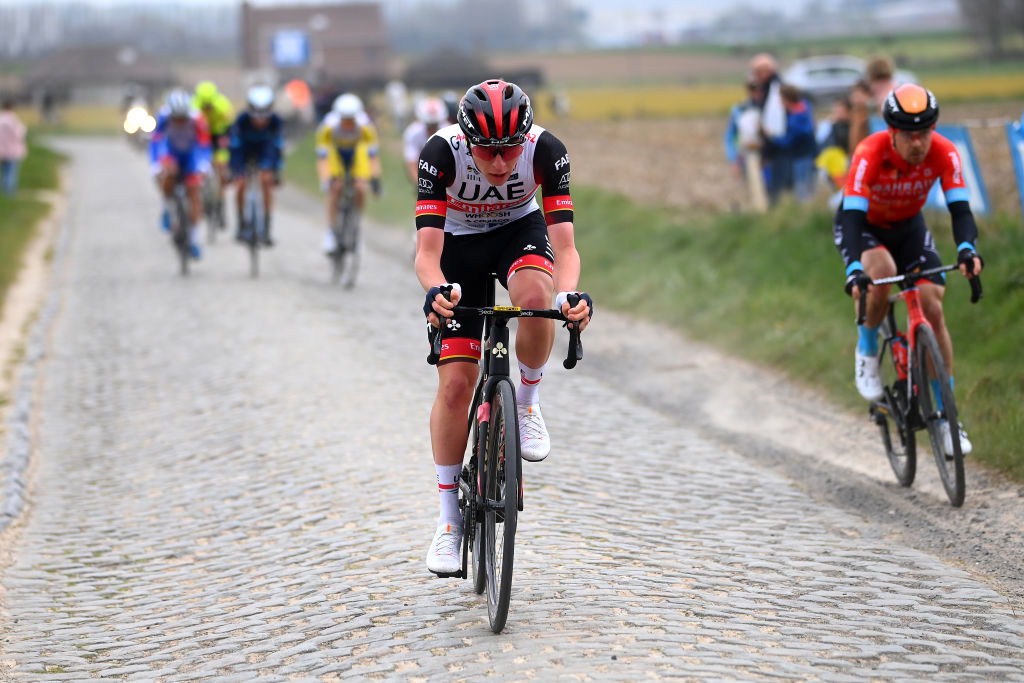Tadej Pogacar: The distance can help me at the Tour of Flanders
"If I do everything perfect, then I can be at the front," warns Tour de France winner

The latest race content, interviews, features, reviews and expert buying guides, direct to your inbox!
You are now subscribed
Your newsletter sign-up was successful
Snow was general all over the Flemish Ardennes on Friday morning, and the cobblestones were softly dusted as Tadej Pogačar finalised his preparations for the Tour of Flanders. Those conditions convinced several other teams to call off their pre-race reconnaissance, but UAE Team Emirates proceeded as planned with their scouting mission, perhaps reasoning that Pogačar could do with absorbing every available detail ahead of his Ronde debut.
After all, four years and about 15 degrees Celsius separated Tadej Pogačar from his last visit to the Oude Kwaremont. In 2018, the Slovenian was part of the chasing group that reached Oudenaarde six seconds down on winner James Whelan at the end of an unusually balmy edition of the under-23 Tour of Flanders.
“I was cramping, I can remember,” Pogačar told reporters at the Park Hotel in Waregem later on Friday. “It was kind of a hot day, riding for the national team. It was nice day, and I finished in the small group in the front, but I remember I was not super good. But it was totally different back then compared to now.”
Pogačar’s status, certainly, has changed altogether. Back then, he was just one talented espoir among many. Now, he lines up for his debut in the elite Tour of Flanders as the outstanding rider of the current peloton. On the evidence of his metronomic dominance these past two years, comparisons with Eddy Merckx seem anchored in fact rather than floated on hyperbole.
Despite Pogačar’s inexperience in this particular arena, he lines out among the top contenders for victory, and that status has only increased since it emerged that the consensus pre-race favourite, Wout van Aert (Jumbo-Visma) will be absent due to illness.
“It’s going to be a crazy race whether Wout is there or not,” said Pogačar, who felt his pre-race ratings in the Belgian newspapers had been overly generous. “I would not give myself four stars for Sunday. But if I do everything perfect, then I can be at the front. For sure, the shape is good.”
Pogačar’s performance at Wednesday’s Dwars door Vlaanderen confirmed as much, but his first cobbled Classic as a professional also highlighted his inexperience in this most particular genre of racing. The 23-year-old was caught on the back foot before the climb of Berg Ten Houte, and by the time he picked his way through the bunch again, the winning move had forged clear.
The latest race content, interviews, features, reviews and expert buying guides, direct to your inbox!
For the rest of the afternoon, Pogačar found himself in the unfamiliar position of chasing a race rather than breaking it apart. He finished the day 10th, two minutes down on winner Mathieu van der Poel (Alpecin-Fenix). His first encounter with the cobbles had been just as much of a culture shock as he had anticipated.
“I had an idea of how it would look and it was like this: it was nervous, hectic, with some crashes, left and right, fighting for positions, sprinting up the small climbs…” Pogačar said. “Yeah, it was more or less like I thought it would be, but it was still a bit of a shock for the body and the mind on Wednesday. You need to be in position all the time.”
Going the distance
The Tour of Flanders, however, also belongs to a subset of races where Pogačar has already proven himself. In the past 12 months, he has annexed two of the five Monuments – Liège-Bastogne-Liège and Il Lombardia – and ignited the finale of another at Milan-San Remo. The mammoth distance of these events plays firmly to Pogačar’s powers of endurance. Dwars door Vlaanderen was a breathless, 184km-long scramble for position. The Ronde, by contrast, is a 272km-long battle of attrition.
“The long distance is a plus for me, I think,” Pogačar said. “With the short climbs, it’s really tricky and nervous, but I think the distance will help me a little bit, and the cold weather also.”
Pogačar can rely, too, on the counsel and support of Matteo Trentin, who returned to racing last weekend after suffering a concussion in a crash at Paris-Nice. The Italian reckons that Pogačar’s deficit in experience can be offset by his surfeit of power.
“If something goes wrong, he’s strong enough to get back in the place he needs to be,” said Trentin. “But of course we’ll try not to have this problem.”
On Monday, Pogačar will avail of his proximity to Arenberg to ride the cobblestones he will face on stage 5 of the Tour de France, but his participation in the Ronde is not simply a training exercise ahead of July. “Maybe I am out of my comfort zone, but it’s motivation for me to do new challenges,” said Pogačar.
And, although he confessed that the Tour of Flanders did not inspire him during his childhood in Slovenia – “For us, it was not Holy Week like here in Belgium,” he smiled apologetically – Pogačar seems to have grasped the tenets of the race on the fly.
His biggest fear for Sunday, he said, was to repeat the error he made at Dwars door Vlaanderen: “I don’t want to be caught behind or not in position when the race goes.”

Barry Ryan was Head of Features at Cyclingnews. He has covered professional cycling since 2010, reporting from the Tour de France, Giro d’Italia and events from Argentina to Japan. His writing has appeared in The Independent, Procycling and Cycling Plus. He is the author of The Ascent: Sean Kelly, Stephen Roche and the Rise of Irish Cycling’s Golden Generation, published by Gill Books.
